Search Results for 'looked'
-
AuthorSearch Results
-
February 5, 2026 at 11:51 pm #8055
In reply to: The Hoards of Sanctorum AD26
Helier watched Yvoise squinting at the bone through her screen, trying to decipher the “map” amidst the noxious fumes. He observed the scene with a detachment that surprised him.
The room was vibrating with tension, but for once, it wasn’t coming from Yvoise —it was directed at her. She was standing by the window, phone pressed to her ear, nodding furiously at some invisible bureaucrat on the other end.
“I am violently in agreement with you, Mr. Prufrock,” she was saying, her voice tight but diplomatic. “The olfactory output of Unit 26 is indeed non-compliant with the Olympus Park Clean Air protocols. We are… rectifying the asset.”
It was the “Kyber-Auditor” from the Business Park Administration. The new management had been cracking down lately, restricting their “unauthorized usage” of miracles and enforcing standard operating procedures.
It was all too much noise. Above the smell, which was screaming of decay rather than play, there was the frantic energy of it all. Mrs. Fennel’s panic, Yvoise’s spreadsheets, the looming threat of this “Varlet” from the Council. It was pure Negotium, the active denial of peace, waging war on the idle time of the Romans: Otium. The world was demanding relentlessly that they justify their existence with hygiene certificates, clean surfaces, and significantly fewer piled-up treasures, branding their sacred collections as mere “trip hazards.”
Helier gripped the bamboo handle of his umbrella —a sturdy, shepherd-style thing he had almost tossed into the ‘Charity Pile’ yesterday. He felt a sudden, fierce longing for Otium, a sacred pause where one simply is.
Earlier that morning, a delivery guy had held the elevator door for him with a foot, balancing a mountain of cardboard boxes. A simple, clumsy gesture of kindness amidst the clutter. It had stayed with Helier. It reminded him that you could be overloaded and still have grace. That moment of suspension, of courteous stillness in the middle of the rush, had been a tiny bubble of Otium.
They needed that bubble now. They needed to stop the clock.
Spirius, who had been hovering in the doorway, seemed to hear Helier’s thought.
“A map is useless if you pass out before you can follow it,” Spirius muttered. He stepped fully into the room, brandishing a heavy glass jar like a weapon. “We need a Containment of the Sins.”
“A what?” asked Cerenise, holding her nose.
“Of WHAT?!” asked Yvoise, raising an eyebrow while covering her mouthpiece.
“Sins…” Spirius said doubtfully, “…that should bring back some memories.”
He marched to the table. “Hold on to your halos…”
Yvoise pulled back, shielding her phone. “Wait! I haven’t finished cataloging the striations—”
“The bone will be visible through the glass, Yvoise. But the miasma must be paused.”
Spirius didn’t wait for a vote. He scooped the yellowed bone—and its mysterious map—into the jar. He didn’t recite a Latin prayer. He didn’t summon a lightning bolt. The Administration wouldn’t allow that kind of energy spike anyway. He just screwed the lid on tight, with one word.
“Oïton,” Spirius incanted.
To Helier’s ears, attuned to the drift of languages over centuries, it didn’t sound like a name anymore. It sounded like a desperate, corrupted invocation of the old Latin. Otium. The right to be left alone, fierce as a dragon guarding its sleep.
Psshitt.
It was the sound of a pressure valve releasing. Soft, pneumatic.
Instantly, the stench was cut off. Deleted. The air was neutral again, smelling only of old paper and the faint, metallic tang of Yvoise’s anxiety.
“It is done,” Spirius announced, holding up the jar. The bone rattled inside, harmless now, an archived file. The faint lines of the map were still visible against the glass, safe in their bubble of silence.
“Mr. Prufrock?” Yvoise said into the phone, her voice smooth as silk. “I think you’ll find the sensors are returning to normal parameters. Yes. Have a productive day.”
She hung up and slumped against the curtains, letting out a breath she seemed to have been holding since New Year’s Eve.
“Well,” Helier said, tapping his umbrella on the floorboards, feeling the tension drain from his shoulders. “That felt… cleansing.”
“If we could do that with the auditor, it would be a marvelous idea,” Cerenise agreed, eyeing the jar with renewed interest. “A spiritual purification. Now, Yvoise, hand me a magnifying glass. If we have restored our Otium, we might as well use it to see where this bone wants to take us.”
“A Novena, even,” Yvoise added, a mischievous glint returning to her eye. “Technically, we have ‘cleansed’ the house of the impurity. The Will didn’t explicitly say we had to throw away the good stuff. Just the… bad air.”
Helier smiled. It was a loophole, of course. A massive, gaping loophole. The threat of the Novena still hung over them like a storm cloud that hadn’t quite burst, and the mystery of the Varlet descendant was still unresolved. But for today, the audit was over. The hoard was safe.
“Oïton,” Helier repeated softly, testing the weight of the word. He looked at his umbrella. He wouldn’t need to open it. The storm had passed.
February 5, 2026 at 2:14 am #8054In reply to: The Hoards of Sanctorum AD26
Mrs. Fennel was beating the dust out of a rug with more violence than was strictly necessary. “Another bloody rug,” she moaned. “If I had a penny for every rug in this place, Boothroyd!”
She shook her head, then cursed, as a cascade of dust floated from her hair. “No idea which of them four picked this one up from god-knows-where, but they’re each as bad as the other.”
She paused to wipe her brow with a corner of her apron, wheezing slightly. “I’m telling you,” she whispered, peering at him conspiratorially, “it’s not just clutter anymore. It’s … REMAINS.”
Boothroyd looked up from a tray of seedlings, his brow furrowing. “Remains, Mrs. F?”
“Human remains!” she hissed, leaning in so close he could smell the peppermint gum on her breath. “A stinking, ancient bone in a plastic box, and Miss Cerenise acting like it’s a piece of the Crown Jewels. Then there’s Miss Yvoise, snapping photos on her fancy phone like she’s … I dunno … Sherlock Holmes or something. And the smell… dear lord, I couldn’t get out of there fast enough.”
Boothroyd grunted, his gaze drifting toward the cellar door. “They do seem particularly out of control lately. My boots are still damp from that ridiculous boat business. I’m not sure they know which century they’re living in.”
“Anyway bone or no,” Mrs. Fennel huffed, “if that gentleman from the Council shows up, that Varlet fellow they’re on about, we’ll all be out on the street, mark my words!”
February 5, 2026 at 1:31 am #8053In reply to: The Hoards of Sanctorum AD26
“Not so fast, Mrs. Fennel,” said Yvoise, blocking the woman’s path as she tried to make a hasty exit. “You don’t happen to have a clean tea towel on you, do you?”
Gratefully, Yvoise took the proffered tea towel Mrs. Fennel threw at her as she all but ran through the door. She wrapped it over her nose as she watched Cerenise poke delightedly at the yellow lace.
“Honestly, Cerenise, we need to make haste getting rid of it. That thing stinks.” Yvoise liked order; she had learned to arrange her own space around neat piles of files, records, and lists. To her, most of the house wasn’t just a mess — it was an abject failure of hoarding protocols. But she had also learned that in order to live in harmony with others, she had to hold her tongue. She sighed and opened the Relics and Records spreadsheet on her phone. Item 2753, she typed. One bone bobbin. She ventured as near as she could and, reaching out with her phone, snapped a photo of it. Admittedly it wasn’t much, but it did give her some feeling of control.
Helier hovered by the wall, leaning as far as possible away from the stench. “But whose bone is it?” he repeated.
“It’s not just about whose bone it is,” said Spirius, popping his head around the door. “It’s about why it’s here. Austreberthe was a great hoarder, a first-rate hoarder, but,” he paused dramatically, “she always had a reason. She wouldn’t just put it in a Tupperware container for fun.”
“True,” said Cerenise. “She really had a gift for squeezing the joy out of life.” She looked pointedly at Yvoise as she said this.
Fortunately, Yvoise was peering at her phone and didn’t notice. Enlarging the image, she looked puzzled. “There seem to be faint lines scratched into it,” she said. “Like a map.“
January 18, 2026 at 8:18 am #8049In reply to: The Hoards of Sanctorum AD26
Phurt was starting to think something fishy was a play, each time he thought his short spider life had ended he was pulled back from Spiderheaven by some unknown force. Not that he minded this time, there were plenty of places to hide and cast his strong silk cables. He had developed a sense of adventure and the sheer height of some of the mounds made him dizzy. It also made him want to be the first spider in the history of this thread to climb on top of that Mount Wobbly of the Topperware Chain.
Phurt had also noticed a strange and strong smell that seemed to come from the top of Mount Wobbly. Not that he minded the hygiene of the place; it was, to the contrary, a rather promising smell. It was the smell that said swarms of flies would gather there like an endless supply of blessed food.
Seeing that other spiders were gathering at the bottom of Mount Wobbly, he contorted his butt and secured his first cable.

Spirius had been investigating the origin of a strong smell that had started not long after Austreberthe puffed out of existence and became part of the dust she had spent her life chasing away. Which gave him one more proof that his theory of the holy body influence upon the physical world was true. He looked for a pen but they were behind two piles of unopened parcels he had started collecting when he had noticed that the postmen were leaving the boxes unattended and unprotected from the elements on the front porch of houses. His intentions were pure, as any saintly intentions are, but when he saw what good addition to the other boxes they made, he felt a pang of regret each time he thought of giving back those boxes to their rightful recipients.
Alas, most of them were dead by now, so he felt his duty was to keep those boxes intact to honour the memory of the dead.
Yvoise came in just as Spirius saw an odd and colourful australian jumping spider cast a delicate silk thread to one of the bottom row of his Tupperware collection.
“You should really do something about that smell,” she said. “I remember a time when decorum required holy people to exude only fragrance and essential oils.”
“Well, you know, it’s Austreberthe,” he said as wobbly as his heaps of plastic boxes. He had them all. You could even say he started the whole trend of pyramid schemes when his friend Pearl Topper saw him buy boxes from antiques shops. She invented the first plastic box as…
“Well, I asked you a question,” said Yvoise, interrupting his wandering thoughts.
“Have you noticed the spiders,” said Spirius.
“What spiders?”
“I think they’re trying to go up there,” Spirius said. “Look!”
He pointed a proud finger at the top of the highest Topperware tower in the Guyness book of records. A swarm of flies was circling around one of the boxes.
“And that means the smell comes from there.”
January 16, 2026 at 11:00 pm #8048In reply to: The Hoards of Sanctorum AD26
“Bless you,” Helier offered, instinctively sliding the half-chewed pencil stub under a pile of National Geographics from 1978. He felt a flush of guilt, as if he’d been caught trying to steal a kid’s toy.
Cerenise rolled into the room, looking like a sorry pile of laundry. She was wrapped in three different shawls—one Paisley, one Tartan, and one that looked like a doily from a medieval altar. She held a lace handkerchief to her nose, trumpeting into it with a force that rattled the nearby display of thimbles.
“It’s not the damp,” she croaked, her voice an octave lower than usual. “It’s the cleanliness. Since Spirius fixed that pipe, the air is too… sterile. My immune system is in shock. It misses the spores.”
She eyed the spot where Helier had hidden the pencil. “You were thinking about it, weren’t you?”
“Thinking about what?” Helier feigned innocence, picking up a ceramic frog.
“The Novena,” she whispered the word like a curse. “I saw the look in your eye. The ‘maybe I don’t need this’ look. It’s the fever talking, Helier. Don’t give in. I almost threw away a button yesterday. A bakelite toggle from a 1930s duffel coat. I held it over the bin for a full minute.” She shuddered, pulling the shawls tighter. “Madness.”
“Pure madness,” Helier agreed, quickly retrieving the pencil stub and placing it prominently on the desk to prove his loyalty to the hoard. “We must stay strong. Now, surely you didn’t brave the drafty hallway just to discuss my potential apostasy?”
“I didn’t,” Cerenise sniffed, tucking the handkerchief into her sleeve. “I found him. Or at least, I found the thread.”
She wheeled closer, dropping a printout onto Helier’s knees. It was a genealogy chart, annotated with her elegant, spider-scrawl handwriting.
“Pierre Wenceslas Varlet,” she announced. “Born 1824. Brother to a last of the famously named Austreberthes — mortal ones, unsaintly, of course. Her lineage didn’t die out, Helier.”
Helier squinted at the paper. “Varlet? Sounds like a villain in one of Liz Tattler’s bodice-rippers. ‘The Vengeful Varlet of Venice’.“
“Focus, Helier. Look at the modern branch.” She pointed to the bottom of the page. “The name changed in the 1950s. Anglicized. And I think, if my research into the local council tax records—hacked via that delightful ‘incognito mode’ you showed me—is correct, the current ‘Varlet’ is closer than we think.”
“How close?”
“Gloucester close,” Cerenise said, her eyes gleaming with the thrill of the hunt, momentarily forgetting her flu. “And you’ll never guess where he works.”
January 6, 2026 at 6:20 pm #8044In reply to: The Hoards of Sanctorum AD26
With a warm smile of approval, Cerenise tapped out the names and dates on her keyboard. So refreshing when people were original when naming the fruit of their loins, she thought. Some of the family trees she’d done for friends and clients had been a veritable cesspit of endlessly repeated Johns and Marys, Williams and Elizabeths. Despite suppressing a shudder when introduced to a modern human named River or Sky, or worse, the ridiculously creative spelling of a common name, some of the older examples of unusual names she found quite delightful. Especially, it had to be said, French ones.
Pierre Wenceslas Varlet born on the 28th of September, 1824 in Clenleu, Pas-de-Calais, brother of Austreberthe Varlet, born two years previously on the 8th of June. Wenceslas! What would you call Wenceslas for short? she mused. Wence?
“An ’twere not as good a deed as drink to turn true man and to leave these rogues, I am the veriest varlet that ever chewed with a tooth”.
A cautious knock at the door interrupted Cerenise’s mental meanderings.
“Enter,” she called, and Laddie Bentry sidled in looking sheepish.
“Ah, it’s you, the veriest varlet of number 26. Well, what is it? You look as though you accidentally dropped Helier’s trashy novel in the water butt.”
Taken aback by Cernice’s perspicacity, Laddie recoiled slightly and then squared his shoulders. “How did you know?” he asked.
“Oh just a lucky guess,” Cerenise replied breezily, tapping the side of her nose. “I suppose you want me to order you another copy from Amaflob before he notices? I’ll arrange for an express delivery. Keep an eye out for the delivery man”
Waving away his thanks, she picked up the old document on her desk that Yvoise had kindly provided, albeit reluctantly, and squinted at it. She could make out the name Austreberthe, but what did the rest say?
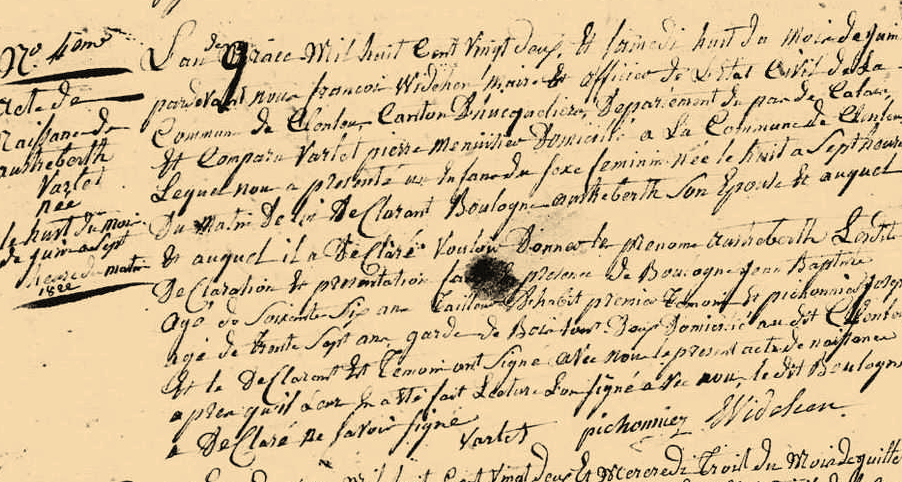
Cerenise dozed off, dreaming of the Folies Bergere. The atmosphere was exciting and convivial at first, escalating into an eruption of approval when the new act came on the stage. Cerenise felt the energy of the crowd but her attention was drawn to the flamboyant figure of a man dressed as one of the three kings of the Magi, and he was making his way over to her. Why, it was Lazuli Galore! What on earth was he doing here? And who was that dumpy overly made up woman in the blue dress, Godfreda, who had tagged along with them?
Another knock on the door wakened her and she called out “Come in!” in an irritable tone. She’d been having such fun in the dream. “Oh it’s you, oh good, the book has arrived.”
Laddie shifted his feet and replied, “Well yes, a Liz Tattler novel has arrived.”
“Oh, good, well be off with you then so I can get on with my work.”
“But it’s not The Vampires of Varna. It’s The Valedictorian Vampires of Valley View High.”
“Jolly good, I expect you’ll enjoy it,” Cerenise said, picking up the old document again and peering at it. Perceiving that Laddie had not yet exited the room, she looked up. “Helier won’t notice, those books are all the same. Now get off with you.”
January 3, 2026 at 9:04 am #8023In reply to: The Hoards of Sanctorum AD26
“Quite fitting that I should get her sleeves,” Cerenise said with satisfaction. “And what a relief that she left the wolf to you, Spirius. I’d not have been able to manage a wolf.” Cerenise popped another cashew nut into her mouth.
Spirius looked at her with a raised eyebrow. “My guess is you’d have managed just fine,” he replied drily. He’d heard all the noise she made behind those locked doors. He’d seen her prancing around the orchard in the moonlight when she thought nobody was watching, naked as the day she was born all those centuries ago. He hadn’t lingered at the window, but he had put two and two together years ago, many years ago, just after the seige of Gloucester. If truth be told, Cerenise’s secret was known to them all, but they hadn’t interfered with her delusion.
“There’s going to come a point, and very soon, when we will have to deal with the water leak, you know,” Yvoise interrupted the inconsequential chatter. “Holy and healing as it may be, it will be the ruin of my collection if it reaches the upper floors.”
“And what do you propose?” asked Helier.
“I suggest we call a plumber!” snapped Yvoise. “This is the 21st century is it not? I know tradesmen are in short supply, and I know this isn’t an ordinary leak, but we should start with the obvious, and then adapt accordingly.”
“I must bottle as much of the holy water as possible before we stop the leak,” Spirius said, standing up abruptly in agitation.
Helier put a calming hand on the old boy’s shoulder. “There’s no rush, Spirius, there’s plenty of water in the cellars, it’s already waist deep down there.”
“And the saints only know what has floated into the cellars by now from the tunnels. Be careful down there, Spirius. Take Boothroyd the gardener with you,” Yvoise advised.
December 31, 2025 at 7:34 pm #8018In reply to: The Hoards of Sanctorum AD26
It must be two hundred years at least since we’ve heard a will read at number 26, Cerenise thought to herself, still in a mild state of shock at the unexpected turn of events. She allowed her mind to wander, as she was wont to do.
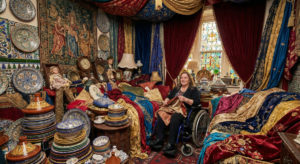 Cerenise had spent the best part of a week choosing a suitable outfit to wear for the occasion and the dressing room adjoining her bedroom had become even more difficult to navigate. Making sure her bedroom door was securely locked before hopping out of her wicker bath chair (she didn’t want the others to see how nimble she still was), she spent hours inching her way through the small gaps between wardrobes and storage boxes and old wooden coffers, pulling out garment after garment and taking them to the Napoleon III cheval mirror to try on. She touched the rosewood lovingly each time and sighed. It was a beautiful mirror that had faithfully reflected her image for over 150 years.
Cerenise had spent the best part of a week choosing a suitable outfit to wear for the occasion and the dressing room adjoining her bedroom had become even more difficult to navigate. Making sure her bedroom door was securely locked before hopping out of her wicker bath chair (she didn’t want the others to see how nimble she still was), she spent hours inching her way through the small gaps between wardrobes and storage boxes and old wooden coffers, pulling out garment after garment and taking them to the Napoleon III cheval mirror to try on. She touched the rosewood lovingly each time and sighed. It was a beautiful mirror that had faithfully reflected her image for over 150 years.Holding a voluminous black taffetta mourning dress under her chin, Cerenise scrutinised her appearance. She looked well in black, she always felt, and it was such a good background for exotic shawls and scarves. Pulling the waist of the dress closer, it became apparent that a whalebone corset would be required if she was to wear the dress, a dreadful blight on the fun of wearing Victorian dresses. She lowered the dress and peered at her face. Not bad for, what was it now? One thousand 6 hundred and 43 years old? At around 45 years old, Cerenise decided that her face was perfect, not too young and not too old and old enough to command a modicum of respect. Thenceforth she stopped visibly aging, although she had allowed her fair hair to go silver white.
It was just after the siege of Gloucester in 1643, which often seemed like just yesterday, when Cerenise stopped walking in public. Unlike anyone else, she had relished the opportunity to stay in one place, and not be sent on errands miles away having to walk all the way in all weathers. Decades, or was it centuries, it was hard to keep track, of being a saint of travellers had worn thin by then, and she didn’t care if she never travelled again. She had done her share, although she still bestowed blessings when asked.
It was when she gave up walking in public that the hoarding started. Despite the dwellings having far fewer things in general in those days, there had always been pebbles and feathers, people’s teeth when they fell out, which they often did, and dried herbs and so forth. As the centuries rolled on, there were more and more things to hoard, reaching an awe inspiring crescendo in the last 30 years.
Cerenise, however, had wisely chosen to stop aging her teeth at the age of 21.
Physically, she was in surprisingly good shape for an apparent invalid but she spent hours every day behind locked doors, clambering and climbing among her many treasures, stored in many rooms of the labyrinthine old building. There was always just enough room for the bath chair to enter the door in each of her many rooms, and a good strong lock on the door. As soon as the door was locked, Cerenise parked the bath chair in front of the door and spent the day lifting boxes and climbing over bags and cupboards, a part of herself time travelling to wherever the treasures took her.
Eventually Cerenise settled on a long and shapeless but thickly woven, and thus warm, Neolithic style garment of unknown provenance but likely to be an Arts and Crafts replica. It was going to be cold in the library, and she could dress it up with a colourful shawl.
July 16, 2025 at 6:06 am #7969In reply to: The Elusive Samuel Housley and Other Family Stories
Gatacre Hall and The Old Book
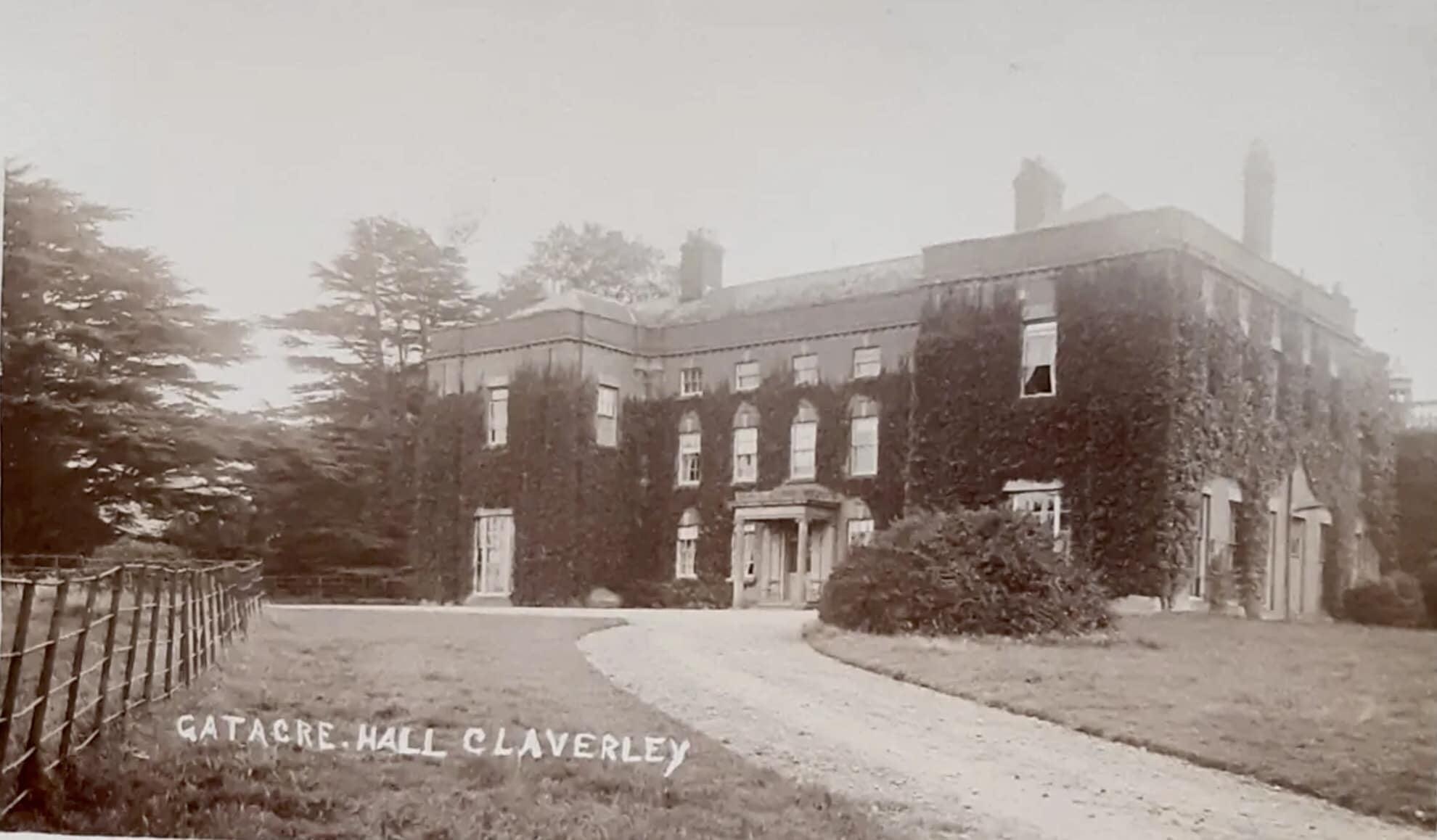
In the early 1950s my uncle John and his friend, possibly John Clare, ventured into an abandoned old house while out walking in Shropshire. He (or his friend) saved an old book from the vandalised dereliction and took it home. Somehow my mother ended up with the book.

I remember that we had the book when we were living in USA, and that my mother said that John didn’t want the book in his house. He had said the abandoned hall had been spooky. The book was heavy and thick with a hard cover. I recall it was a “magazine” which seemed odd to me at the time; a compendium of information. I seem to recall the date 1553, but also recall that it was during the reign of Henry VIII. No doubt one of those recollections is wrong, probably the date. It was written in English, and had illustrations, presumably woodcuts.
I found out a few years ago that my mother had sold the book some years before. Had I known she was going to sell it, I’d have first asked her not to, and then at least made a note of the name of it, and taken photographs of it. It seems that she sold the book in Connecticut, USA, probably in the 1980’s.
My cousin and I were talking about the book and the story. We decided to try and find out which abandoned house it was although we didn’t have much to go on: it was in Shropshire, it was in a state of abandoned dereliction in the early 50s, and it contained antiquarian books.
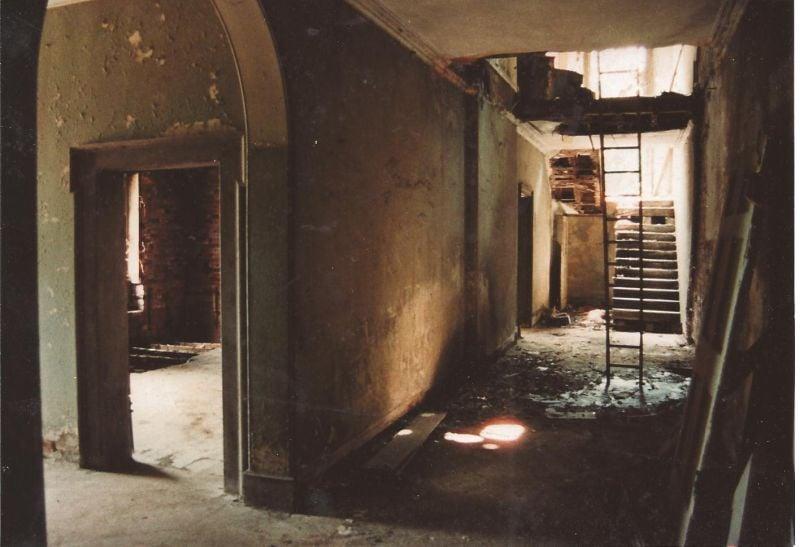
I posted the story on a Shropshire History and Nostalgia facebook group, and almost immediately had a reply from someone whose husband remembered such a place with ancient books and manuscripts all over the floor, and the place was called Gatacre Hall in Claverley, near Bridgnorth. She also said that there was a story that the family had fled to Canada just after WWII, even leaving the dishes on the table.
The Gatacre family sailing to Canada in 1947:
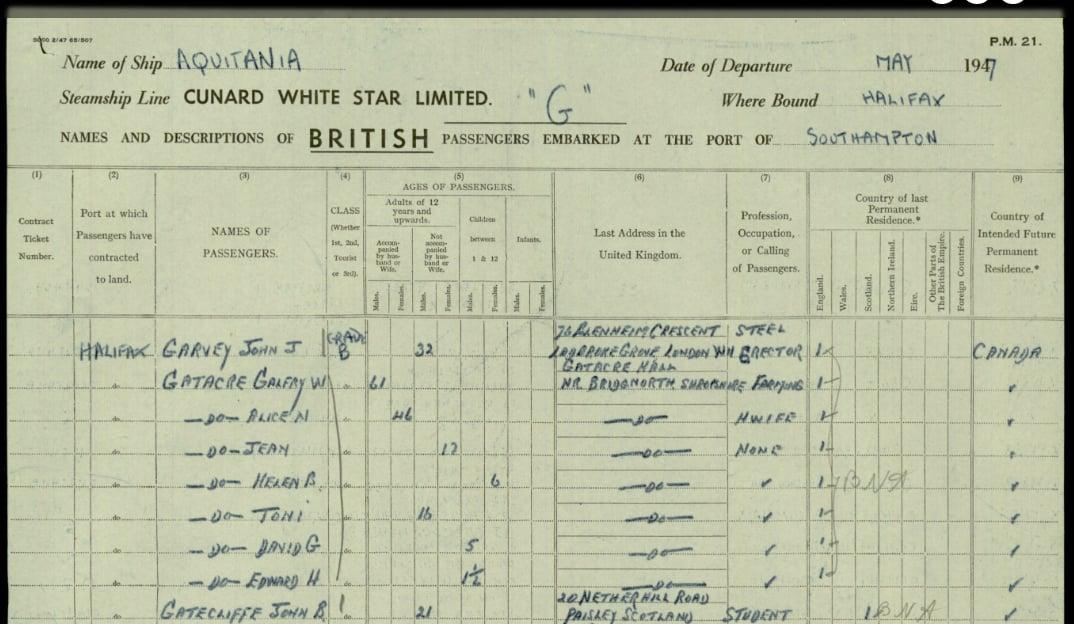
When my cousin heard the name Gatacre Hall she remembered that was the name of the place where her father had found the book.
I looked into Gatacre Hall online, in the newspaper archives, the usual genealogy sites and google books searches and so on. The estate had been going downhill with debts for some years. The old squire died in 1911, and his eldest son died in 1916 at the Somme. Another son, Galfrey Gatacre, was already farming in BC, Canada. He was unable to sell Gatacre Hall because of an entail, so he closed the house up. Between 1945-1947 some important pieces of furniture were auctioned, and the rest appears to have been left in the empty house.
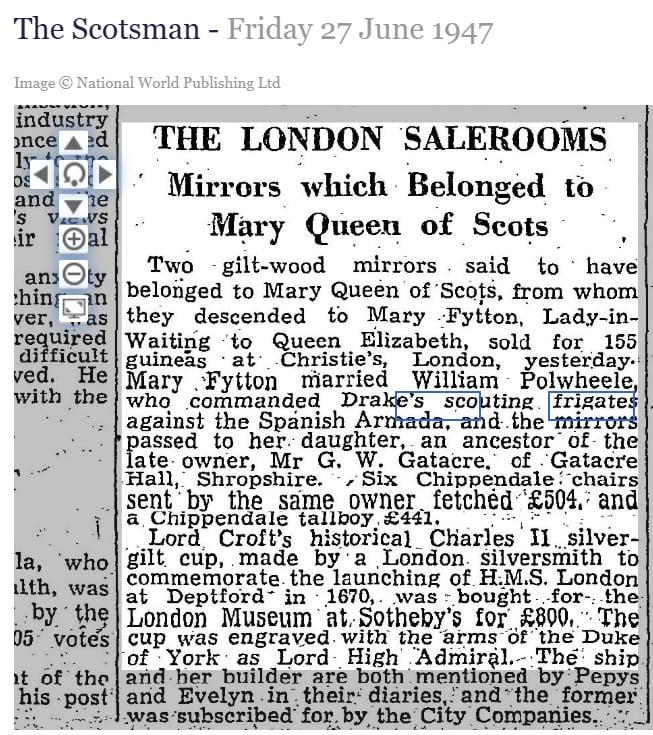
The family didn’t suddenly flee to Canada leaving the dishes on the table, although it was true that the family were living in Canada.

An interesting thing to note here is that not long after this book was found, my parents moved to BC Canada (where I was born), and a year later my uncle moved to Toronto (where he met his wife).
Captain Gatacre in 1918:
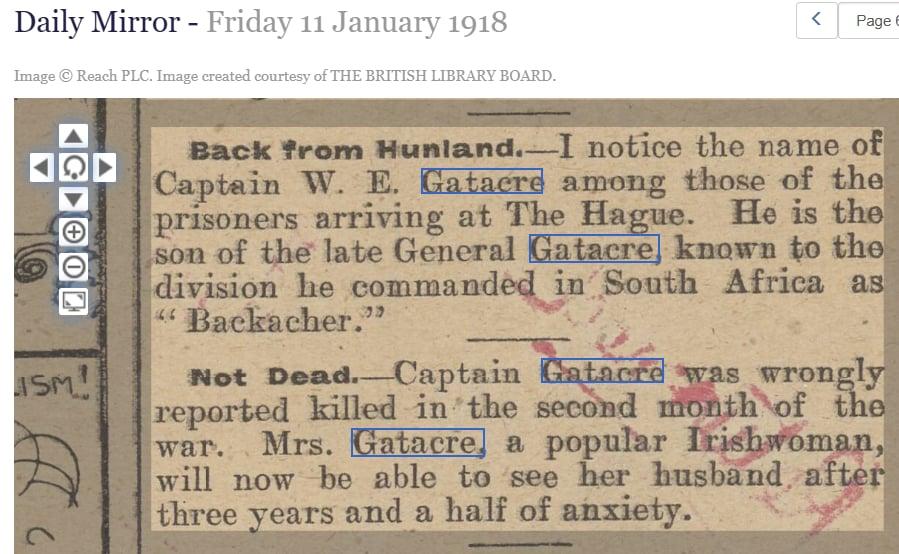
The Gatacre library was mentioned in the auction notes of a particular antiquarian book:
“Provenance: Contemporary ownership inscription and textual annotations of Thomas Gatacre (1533-1593). A younger son of William Gatacre of Gatacre Hall in Shropshire, he studied at the English college at the University of Leuven, where he rejected his Catholic roots and embraced evangelical Protestantism. He studied for eleven years at Oxford, and four years at Magdalene, Cambridge. In 1568 he was ordained deacon and priest by Bishop of London Edmund Grindal, and became domestic chaplain to Robert Dudley, 1st Earl of Leicester and was later collated to the rectory of St Edmund’s, Lombard Street. His scholarly annotations here reference other classical authors including Plato and Plutarch. His extensive library was mentioned in his will.”


There are thirty four pages in this 1662 book about Thomas Gatacre d 1654:

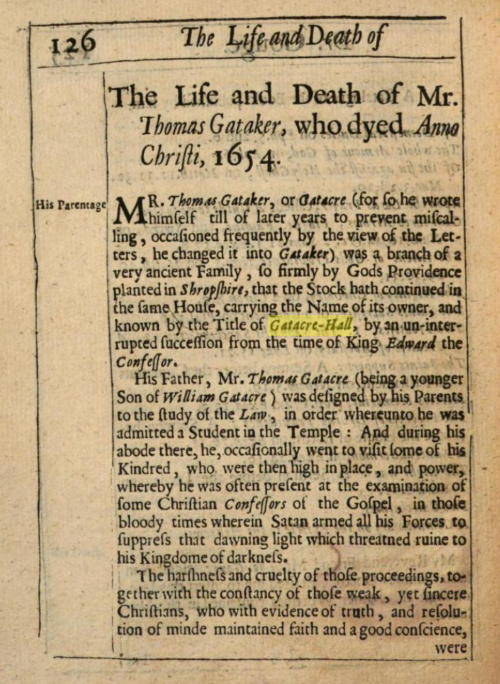 June 11, 2025 at 7:50 pm #7962
June 11, 2025 at 7:50 pm #7962In reply to: Cofficionados Bandits (vs Lucid Dreamers)
The hat was gone.
Kit stood blinking in the sun, the shape of his new self cooling around the edges like a half-written cookie losing form. Without the cowboy hat, the lasso made less sense. His accent wobbled, then vanished completely. The sunglasses stayed, but now just made everything too dark, even tinted pink.
Behind him, the gazebo creaked again. But no trapdoor this time—only a faint whirring, like a film projector syncing spools.
“It’s reloading,” said Thiram from the sidelines, tapping at something that looked oddly like a pressure-gauged Sabulmantium. “Every time someone hands off a narrative object—like a synch, a hat, a horse even—it updates roles. We’re being cast on the fly.”
Chico looked up from Tyrone, who had snatched one of the Memory Pies and was now attempting to hide the evidence behind a flowerpot. “So… Kit’s not Trevor anymore?”“No,” said Carob, arms crossed. “He’s Trevorless. That identity didn’t bake fully. We have to stabilize it.”
“But with what?” asked Godrick, who had returned carrying a second cocktail, coffee with a glass of water and a slight wry smirk.
Amy, now balancing the cowboy hat on her head as she crouched next to the still-disoriented Padre, called out without turning:
“Bring him another Synch. That’s how it works now, apparently. Hat or otherwise.”
June 11, 2025 at 6:07 pm #7960In reply to: Cofficionados Bandits (vs Lucid Dreamers)
As Chico carried the Memory Pie over to Kit, a breeze shuffled the pages of the script lying abandoned beside the gazebo. No one had noticed it before—maybe it hadn’t been there. The pages were blank. Then they weren’t.
Kit blinked. “Did you just call me Trevor?”
“No,” said Chico. But he looked uncertain. “Did I?”
There was a rumble below them. The gazebo creaked—faint and subtle, like a swedish roll turning in its deep sleep.
Then—click-clac thank you Sirtak.
A trapdoor swung open beneath Kit’s feet. But instead of falling, Kit froze mid-air.
The air flickered. Kit shimmered.
And now they were wearing sunglasses, holding a cowboy lasso, and speaking in a faint Midwest accent.
“Sorry, I think I missed my cue. Where are we in the scene?”
June 11, 2025 at 10:13 am #7959In reply to: Cofficionados Bandits (vs Lucid Dreamers)
“Buns and tarts!” called a street vendor from the street outside the Gazebar. “Freshly baked Memory Pies! Nostalgia Rolls! Selling like Hot Cakes! Come and get ’em before they run out!”
Chico realised he’d hardly eaten a thing since becoming a new character. Maybe this is how character building works.
“I’ll take one of each,” Chico said to the smiling round faced vendor. I need to stock up on memories.
“Are they all for you, sir?” the vendor asked. Chico couldn’t help thinking he looked like a frog. Nodding, Chico said, “Yeah, I’m hungry for a past.”
“We normally suggest just one at a time,” the frog said (for he had indeed turned into a frog), “But you look like a man with a capacity for multiple memories. Are you with friends?”
“Er, yeah, yes I’m with friends,” Chico replied. Are the other new characters my friends? “Yes, of course, I have lots of friends.” He didn’t want the frog vendor to think he was friendless.
“Then we suggest you share each cake with the friends you want to share the memory with.”
“Oh right. But how do I know what the memory is before I eat the cake?”
“Let me ask you this,” said the frog with a big smile, “Do real people choose who to share their memories with? Or know in advance what the memories will be?”
“How the hell would I know!” Chico said, roughly grabbing the paper bag of buns. “I’m new here!”
June 11, 2025 at 9:14 am #7958In reply to: Cofficionados Bandits (vs Lucid Dreamers)
Chico poured grenadine into an ornate art nouveau glass filled with ginger ale. He hesitated, eying the tin of chicory powder. After a moment of deliberation, he sprinkled a dash into the mix, then added the maraschino cherry.
“I’m not sure Ivar the Boneless, chief of the Draugaskald, will appreciate that twist on his Shirley Temple,” said Godrick. “He may be called Boneless, but he’s got an iron grip and a terrible temper when he’s parched.”
Chico almost dropped the glass. Muttering a quick prayer to the virgin cocktail goddess, he steadied his hand. Amy wouldn’t have appreciated him breaking her freshly conjured aunt Agatha Twothface’s crystal glasses service.
“I don’t know what you mean,” said Chico a tad too quickly. “Do I know you?”
“I’m usually the one making the drinks,” said Godrick. “I served you your first americano when you popped into existence. Chico, right?”
“Oh! Yes. Right. You’re the bartender,” Chico said. He fidgeted. Small talks had always made him feel like a badly tuned Quena flute.
“I am,” said Godrick with a wink. “And if you want a tip? Boneless may forgive you the chicory if you make his cocktail dirty.”
Chico pause, considered, then reached down, grabbed a pinch of dust from the gazebo floor, and sprinkled it on the Temple, like cocoa on a cappuccino foam. He’d worked at Stardust for years before appearing here, after all. When he looked up, Godrick was chuckling.
“Ok!” Godrick said. “Now, add some vodka. I think I’ll take it to Ivar myself.”
“Oh! Right.” Chico nodded, grabbed the vodka bottle and poured in a modest shot and placed it back on the table.
Godrick titled his head. “Looks like your poney wants a sip too.”
For a moment, Chico blinked in confusion at the black stuffed poney standing nearby. Then freshly baked memories flooded in.
Right, the poney’s name was Tyrone.
It had been a broken toy that someone had tossed in the street. Amy had insisted Chico take it home. “It needs saving,” she said. “And you need the company.”
At first, Chico didn’t know what to do with it. He ended up replacing some of the missing stuffing with dried chicory leaves.
The next morning, Tyrone was born and trotting around the apartment. All he ever wanted was strong alcohol.
Chico had a strange thought, scrolling across the teleprompter in his mind.
Is that how character building works?
June 7, 2025 at 7:32 am #7955In reply to: Cofficionados Bandits (vs Lucid Dreamers)
The wind picked up just as Thiram adjusted the gazebo’s solar kettle. At first, he blamed the rising draft on Carob’s sighing—but quickly figured out that this one had… velocity.
Then the scent came floating by: jasmine, hair spray, and over-steeped calamansi tea.
A gust of hot air blew through the plantation clearing, swirling snack wrappers and curling Amy’s page corners. From the vortex stepped a woman, sequins ablaze, eyeliner undefeated.
She wore a velvet shawl patterned like a satellite weather map.
“Did someone say Auringa?” she cooed, gliding forward as her three crystal balls rotated lazily around her hips like obedient moons.
“Madam Auringa?” Kit asked, wide-eyed.Thiram’s devices were starting to bip, checking for facts. “Madam Auringa claims to have been born during a literal typhoon in the Visayas, with a twin sister who “vanished into the eye.” She’s been forecasting mischief, breakups, and supernatural infestations ever since…”
Carob raised an eyebrow. “Source?”
Humphrey harrumphed: “We don’t usually invite atmospheric phenomena!”
“Doctor Madam Auringa, Psychic Climatologist and Typhoon Romantic,” the woman corrected, removing a laminated badge from her ample bosom. “Bachelor of Arts in Forecasted Love and Atmospheric Vibes. I am both the typhoon… and its early warning system.”
“Is she… floating?” Amy whispered.
“No,” said Chico solemnly, “She’s just wearing platform sandals on a bed of mulch.”
Auringa snapped her fingers. A steamy demitasse of kopi luwak materialized midair and plopped neatly into her hand. It wasn’t for drink, although the expensive brevage born of civet feces had an irrepressible appeal —it was for her only to be peered into.
“This coffee is trembling,” she murmured. “It fears a betrayal. A rendezvous gone sideways. A gazebo… compromised.”
Carob reached for her notes. “I knew the gazebo had a hidden floor hatch.”
Madam Auringa raised one bejeweled finger. “But I have come with warning and invitation. The skies have spoken: the Typhoon Auring approaches. And it brings… revelations. Some shall find passion. Others—ant infestations.”
“Did she just say passion or fashion?” Thiram mumbled.
“Both,” Madam Auringa confirmed, winking at him with terrifying precision.
She added ominously “May asim pa ako!”. Thiram’s looked at his translator with doubt : “You… still have a sour taste?”
She tittered, “don’t be silly”. “It means ‘I’ve still got zest’…” her sultry glance disturbing even the ants.
June 6, 2025 at 6:02 pm #7954In reply to: Cofficionados Bandits (vs Lucid Dreamers)
Another one! A random distant memory wafted into Amy’s mind. Uncle Jack always used to say GATZ e bo. Amy could picture his smile when he said it, and how his wife always smiled back at him and chuckled. Amy wondered if she’d even known the story behind that or if it had always been a private joke between them.
“What’s been going on with my gazebo?” Amy’s father rushed into the scene. So that’s what he looks like. Amy couldn’t take her eyes off him, until Carob elbowed her in the neck.
“Sorry, I meant to elbow you in the ribs, but I’m so tall,” Carob said pointlessly, in an attempt to stop Amy staring at her father as if she’d never seen him before.
Thiram started to explain the situation with the gazebo to Amy’s father, after first introducing him to Kit, the new arrival. “Humphrey, meet Kit, our new LBGYEQCXOJMFKHHVZ story character. Kit, this is Amy’s father who we sometimes refer to as The Padre.”
“Pleased to meet you, ” Kit said politely, quaking a little at the stern glare from the old man. What on earth is he wearing? A tweed suit and a deerstalker, in this heat! How do I know that’s what they’re called? Kit wondered, quaking a little more at the strangeness of it all.
“Never mind all that now!” Humphrey interrupted Thiram’s explanation.
Still as rude as ever! Amy thought.
“I’ve too much to think about, but I’ll tell you this: I’ve planned a character building meeting in the gazebo, and you are all invited. As a matter of fact,” Humphrey continued, “You are all obliged to attend. If you choose not to ~ well, you know what happened last time!”
“What happened last time?” asked Carob, leaning forward in anticipation of an elucidating response, but Humphrey merely glared at her.
Amy sniggered, and Humphrey shot her a lopsided smile. “YOU know what happened in Jack’s GATZ e bo, don’t you, my girl?”
Where were those random memories when you wanted them? Amy had no idea what he was talking about.
“Who else is invited, Humph? asked Chico, resisting the urge to spit.
“My good man,” Humphrey said with a withering look. “Sir Humphrey’s the name to you.”
Sir? what’s he on about now? wondered Amy. Does that make me a Lady?
“Who else is invited, Padre?” Amy echoed.
Humphrey pulled a scroll tied with a purple ribbon out of his waistcoat pocket and unfurled it. Clearing his throat importantly, he read the list to all assembled.
Juan and Dolores Valdez.
Godric, the Swedish barman
Malathion and Glyphosate, Thiram’s triplet brothers. Mal and Glyph for short.
Liz Tattler
Miss Bossy Pants
Goat Horned Draugaskald“Did I forget anyone?” Humphrey asked, peering over his spectacles as he looked at each of the characters. “You lot,” he said, “Amy, Carob, Thiram, Chico, Kit and Ricardo: you will be expected to play hosts, so you might want to start thinking about refreshments. And not,” he said with a strong authoritarian air, “Not just coffee! A good range of beverages. And snacks.”
Thiram, leaning against a tree, started whistling the theme tune to Gone With The Wind. Tossing an irritated glance in his direction, Carob roughly gathered up her mass of frizzy curls and tethered it all in a tight pony tail. I still don’t know what happened before, she fumed silently. The latest developments where making her nervous. Would they find out her secret?
“You guys,” called Chico, who had wandered over to the gazebo. “It’s full of ants.”
June 6, 2025 at 10:32 am #7953In reply to: Cofficionados Bandits (vs Lucid Dreamers)
Carob was the first to find the flyer. It had been pinned to the banyan tree with a teaspoon, flapping just slightly in the wind like it knew how ridiculous it was.
FIVE HURT IN GAZEBO DRAMA
Local Brewmaster Suspected. Coffee Stains Incriminating.She tapped it twice and announced to no one in particular, “I told you gazebos were structurally hostile.”
Amy poked her head out of the linen drying shed. “No, you said they were ‘liminal spaces for domestic deceit.’ That’s not the same as a health hazard.”
“You ever been in a gazebo during a high wind with someone named Derek? Exactly.”
Ricardo ran past them at an awkward crouch, muttering into a device. “…confirming perimeter breach… one is wearing a caftan, possibly hallucinating… I repeat, gazebo situation is active.”
Chico wandered in from the side trail, his shirt unbuttoned, leaf in mouth, mumbling to Kit. “I don’t know what happened. There was a conversation about frothed chalk and cheese, and then everything… rotated.”
Kit looked solemn. “Aunt Amy, he sat on it.”
“He sat on the gazebo?” Amy blinked.
“No. On the incident.”
Kit offered no further explanation.
From the underbrush, a low groan emerged. Thiram’s voice, faint: “Someone built a gazebo over the generator hatch. There are no stairs. I fell in.”
Amy sighed. “Goddammit, Thiram.”
Carob smirked. “Gazebo’d.”
May 17, 2025 at 9:30 pm #7937In reply to: Cofficionados Bandits (vs Lucid Dreamers)
Ricardo splattered the coffee all over Amy, turning a shade of purple in the process.
“What did you put in it? It tastes absolutely revolting!”
Carob tittered. “Just as well. I had my doubts about this new Toktok craze about putting dried shallots and spring onions in lattes. Guess my hunch was on the money.”
Amy wanted to feel incensed, but her brain had stopped at the description of the offending latte “You put what in his latte?! And that coffee’s going to stain my shirt now, I’ll look like a spotted leopard!”
“Funny,” Carob looked down at Amy “that you should pronounce that loo-pard… You sound like a hooligan.”
“Well, better that than an ooligarch.”
“You did it again!”
“Ooh, shut up Caroob.”
May 16, 2025 at 3:20 am #7935In reply to: Cofficionados Bandits (vs Lucid Dreamers)
“I don’t know, Amy. I thought it was Chico who was mysterious — subversively spitting at every opportunity.”
“Well, Carob, maybe we could just agree they’re equally mysterious?” suggested Amy, turning her attention back to her search.
Carob shrugged. “A woman in Greece is divorcing her husband because AI read her coffee cup and said he was cheating.”
Amy paused and looked up. “For real?”
“Yeah. I read it on Thiram’s news stream. He left it running on that weird device of his — over there, next to his half-drunk coffee. Not sure where he went, actually.”
Amy gasped and clapped her hands. “Oh! Oh! Brainwave occurring — let’s get AI to read Thiram’s coffee cup!”
Carob snorted. “Genius.”
They raced over to the small folding table where Thiram’s cup sat. Carob held up her phone.
“Okay. One quick pic. Hold it steady!”
They excitedly uploaded the image to an AI analysis app Thiram had installed on his device.
The app whirred for a few minutes:
DEEP COFFEE CUP ANALYSIS COMPLETE
Latent emotional residue: contemplative, fond of secrets.
Foam pattern suggests hidden loyalty to an entity known only as “The Port.”
Swirling suggests alignment with larger forces not currently visible.
Presence of cardamom notes: entirely unaccounted for.
Recommendation: approach carefully with gentle questioning.“Blimey, what does that mean?” asked Carob.
Amy nodded solemnly, perhaps with just a touch of smugness. “He is a man of mystery. Didn’t I say it?”
April 27, 2025 at 3:06 pm #7911In reply to: Cofficionados Bandits (vs Lucid Dreamers)
To say that Amy was shocked when she looked up the word thiram would be an understatement. Who would name a baby after a toxic fungicide?
“Oh, guess what!” Thiram announced, entirely coincidentally. “My brothers are coming to join us, Malathion and Glyphosate. We’re triplets,” he added.
April 27, 2025 at 1:39 pm #7909In reply to: Cofficionados Bandits (vs Lucid Dreamers)
A mad cackle started to shake the Universe again.
“Mmm…” Thiram interjected. “Not like you to be so hung up on details now? Although, I thought that was the whole point — coffee beans acclimation to whole unexpected new places, with the AI models predicting or hallucinating the shifts of weather patterns and all? Surely coffee beans no longer grow where they’re supposed to?”
They all looked at him with eyes like coffee cup’s saucers.
“And what’s that place you’re calling Florida by the way?” he felt pressed to add.
The cackling intensified, shaking their sense of geography to the core.
-
AuthorSearch Results